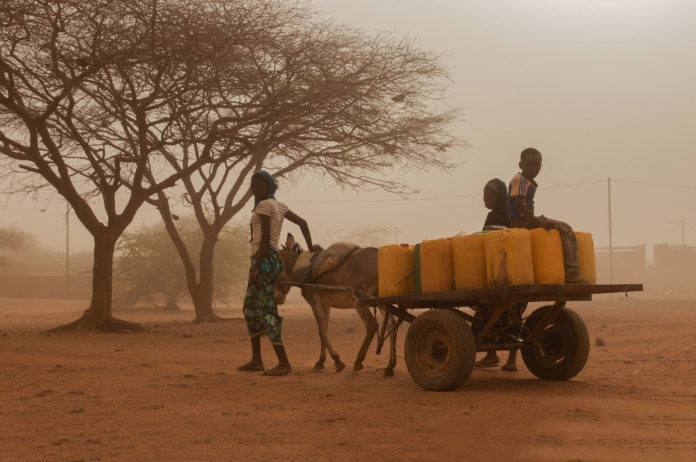At a time when several West African countries are affected by violence, the United Nations has called on governments in the sub-region, notably those of the G5 Sahel and the Lake Chad Basin, to step up their development programs in order to improve living conditions for their populations.
Mohamed Ibn Chambas, UN Special Representative for West Africa and the Sahel, declared that "in recent weeks, insecurity has seen unprecedented peaks. In the Sahel - in Mali, Burkina Faso and Liptako-Gourma in particular. But also in the Lake Chad basin, where Boko Haram continues to threaten populations and displaced persons".
"The United Nations condemns these attacks, which continue to target civilians, security forces and peacekeepers, as well as economic actors. This underlines - once again - the urgent need for regional mobilization", said the head of the United Nations Office for West Africa and the Sahel (UNOWAS).
Mr. Chambas attended the G5 Sahel summit in Ouagadougou, the capital of Burkina Faso. He believes that the commitments made by the five countries during the summit must be supported by the international community. "It is vital that the financial aid promised to the Joint Force be released to enable effective implementation of the Force," said the Special Representative, who believes it is equally urgent to provide the financial aid promised in December 2018 to make the roadmap adopted by the G5 Sahel under the Priority Investment Program a reality.
Mali, Burkina Faso: worrying signs of inter-community conflict
January brought worrying signs of deadly inter-community conflicts in Mali and Burkina Faso, pitting the Peulh against other communities. For Mr. Chambas, the spiral of violence can only lead to chaos and misfortune for all these communities.
"We know that one of the traditions of this region has been peaceful coexistence between groups for centuries. This is the driving force behind economic exchanges", he said, adding that "respect, solidarity and sharing between communities are what bind West Africa together".
Divisions and cycles of murderous reprisals are precisely what extremists are looking for: the breakdown of this social and national cohesion, warned the Special Representative. "It's part of their strategy".
The head of UNOWAS believes that there is now a need for dialogue, rapprochement and justice in the Sahel, to restore the traditional balance. "The future of this region is at stake", he said, stressing that governments and local players must mobilize to this end.
"We know that military action alone cannot eradicate the poison of the terrorist threat", said Mr. Chambas. "The commitment of governments and the support of the international community are just as decisive in turning the tide and returning the subregion to a dynamic of sustainable development and stability", he added, pointing out that the United Nations, through the Integrated Strategy for the Sahel and the Support Plan, will remain committed to helping the G5 Sahel countries.
Elections in Senegal and Nigeria
Against this gloomy security backdrop, Mr. Chambas emphasized to the Security Council that West Africa was also experiencing positive developments.
"Over the past six months, presidential elections have been successfully held in Mali, regional and parliamentary elections have been organized in Mauritania and Togo, and local elections have been held in Côte d'Ivoire"
"However, despite good progress in consolidating democracy in the region, continued efforts are needed to resolve election-related disputes, to prevent and mitigate election-related violence, as well as to support inclusive dialogue as a key element of inclusive societies. This is all the more important as over the next six months, several high-stakes elections will be held in Nigeria, Senegal, Mauritania and Benin."
In particular, the head of the United Nations Office for West Africa and the Sahel (UNOWAS) noted that tensions in Nigeria were high ahead of the presidential and legislative elections on February 16 and the governors' and state assemblies' elections on March 2.
"The next round of elections in the region will be a decisive test for the consolidation of democratic gains. The creation of an environment conducive to full respect for human rights will be essential to the success of these elections and the preservation of stability in the region", he said.
Unstable security situation in the Sahel
The security situation also remains unstable in the Sahel. In Burkina Faso, a state of emergency has been declared in seven of the country's thirteen regions, in the north, west and east, amid a resurgence of security incidents. Despite the mass mobilization, Niger's defense and security forces continue to face challenges in the west and south. "Increasing attacks and kidnappings by extremist groups are heightening security risks in Niger, Benin and Togo".
According to the UN envoy, growing insecurity is placing a heavy burden on governments in the region, against a backdrop of high population growth and rising youth unemployment. Economic austerity measures, including the elimination of subsidies on basic necessities in some countries, have also exacerbated social tensions.
In this context, greater support is needed to advance stabilization efforts in the Sahel. The G-5 Sahel (Burkina Faso, Mali, Mauritania, Niger and Chad) priority investment plan, presented in Nouakchott on December 6, requires $2.4 billion in funding.


